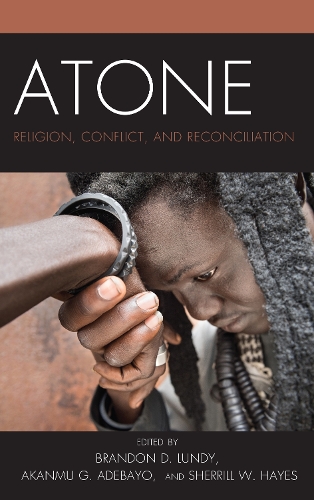
Atone: Religion, Conflict, and Reconciliation
(Hardback)
Publishing Details
Atone: Religion, Conflict, and Reconciliation
By (Author) Brandon D. Lundy
Edited by Akanmu G. Adebayo
Edited by Sherrill Hayes
Contributions by Akanmu G. Adebayo
Contributions by Sherrill Hayes
Contributions by Brandon D. Lundy
Contributions by Ziaul Haque
Contributions by Aaron Clarke
Contributions by Daniel Cere
Contributions by Ratna Ghosh
Bloomsbury Publishing PLC
Lexington Books
26th February 2018
United States
Classifications
Professional and Scholarly
Non Fiction
201.7273
Physical Properties
Hardback
364
Width 158mm, Height 240mm, Spine 33mm
735g
Description
The relationship between religion and conflict has generated considerable academic and political debate. Although the majority of religions and spiritual traditions are replete with wisdom that propagates a broader unity among human beings, these same examples have been used to legitimize hatred and fear. While some studies claim that religion facilitates peacebuilding, reconciliation, and healing, others argue that religion exacerbates hostility, instigates vengeance-seeking behaviors, and heightens conflict. But religion does not act by itself, human beings are responsible for acts of peace or conflict, of division or reconciliation, in the name of religion. This book addresses these rather complex issues from the perspective of reconciliation, or atonement, to advance both the frontiers of knowledge and the global search for alternative paths to peace. The contributions in the volume focus in three areas: (1) Reconciling Religious Conflicts, (2) Reconciling Conflict through Religion, and (3) Religious Reconciliations. In each of these sections scholars, practitioners, and religious leaders address specific examples that highlight the complex intersections of religious practices with global conflict and reconciliation efforts. This informative and provocative book is relevant for students and faculty in peace and conflict studies, religious studies, humanities, social sciences, and provides insights useful to practitioners and professionals working in peacebuilding and international development seeking to promote effective resolution and reconciliation efforts.
Reviews
This book provides an interesting and eclectic set of case studies that problematize the paradoxical position of religion in modern conflict. With an important emphasis on under-addressed contexts like Africa, halal food, and religious songs, the books unique approach to the complicated interconnections between religion and reconciliation provides both academics and religious practitioners with evidence-based examples of religions social influence in the contemporary world. The books attempt to blend insider and outsider perspectives on religion as a driver of peaceful social change interrupts long held debates within the fields of Religious Studies and Peace and Conflict Studies. -- Jeremy A. Rinker, University of North Carolina, Greensboro
Though images of religion-related violence around the world shape our perception of activist faith in the global era, these thoughtful essays show that religion can be not only a source for conflict but also a basis for tolerance, acceptance, and reconciliation. It is a useful corrective and a significant contribution to the growing literature on religion and peacebuilding in all traditions. -- Mark Juergensmeyer, University of California, Santa Barbara
Author Bio
Brandon D. Lundy is associate professor of anthropology and associate director in the School of Conflict Management, Peacebuilding and Development at Kennesaw State University. Akanmu G. Adebayo is professor of history at Kennesaw State University. Sherrill W. Hayes is professor and associate director of the School of Conflict Management, Peacebuilding, and Development at Kennesaw State University.
